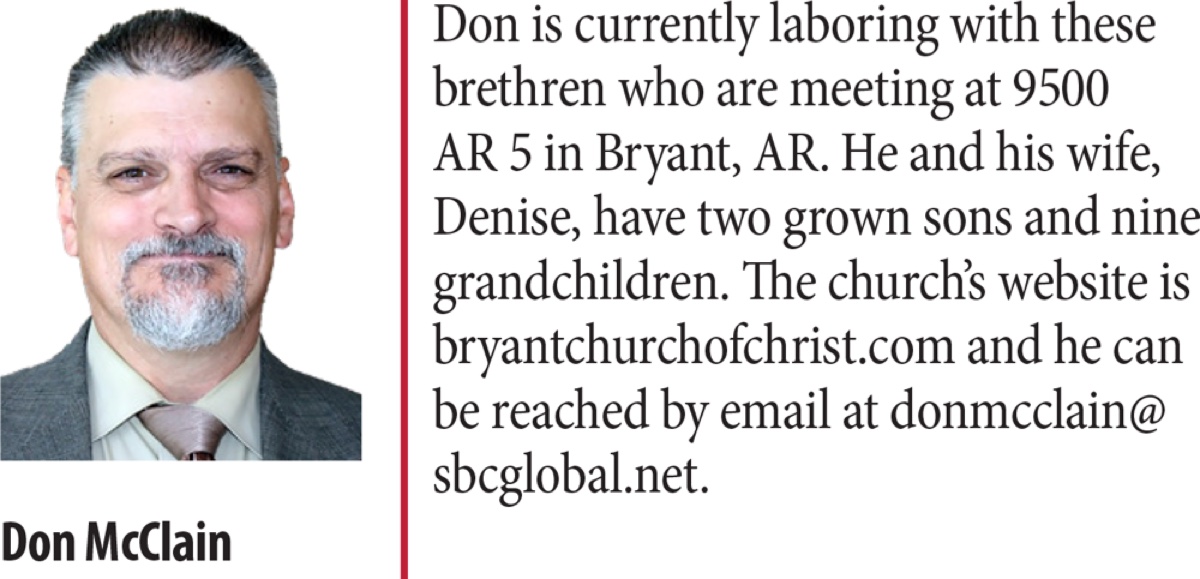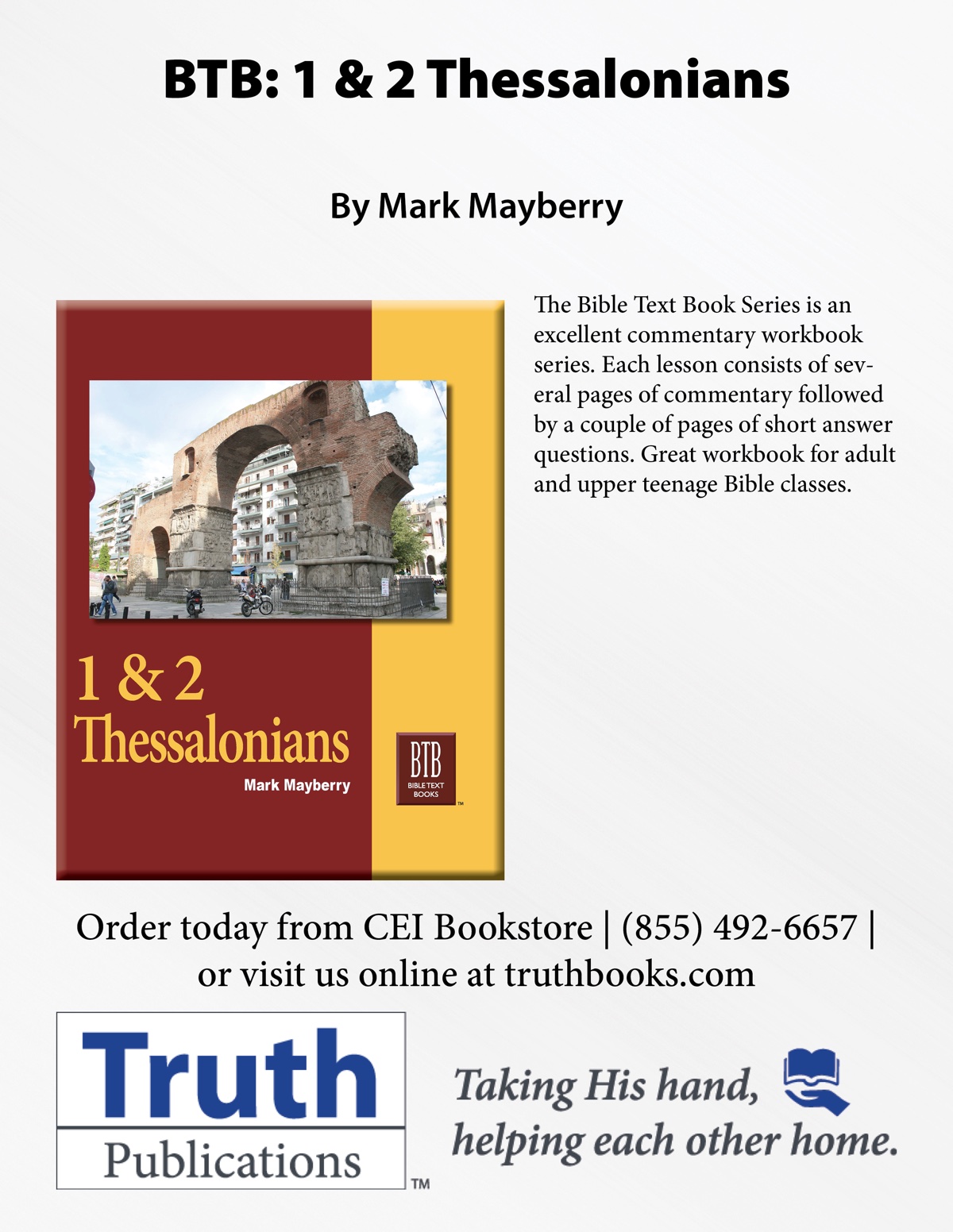By Don McClain
Synopsis: Our understanding of the eternal judgment should not only motivate us to a healthy fear of sin and proper reverence towards God, but will also help intensify and develop a more focused devotion to Him, and a greater appreciation for His love, mercy, and patience!
The six “elementary principles” given by the Hebrew writer in chapter 6:1-2, are fundamental teachings followers of Jesus should already believe and understand: the foundation of repentance from dead works and of faith toward God, of the doctrine of baptisms, of laying on of hands, of resurrection of the dead, and of eternal judgment. Our belief in these things should serve as a catalyst for us to develop into the individuals God intends for us to become. The final elementary principle mentioned, the teaching of the future “eternal judgment,” will be the focus of this article and is indeed a fundamental teaching of Scripture (Matt. 25:31-46; John 5:28-29; Acts 10:42; 17:30-31; 24:25; 2 Cor. 5:10; Rom. 2:5-11).
What is the doctrine of eternal judgment? There are many temporal judgments of God recorded in the Scriptures that come upon the wicked. In the past, God has judged individuals, cities, nations, and even the world, providing the precedent and foreshadowing for the future, eternal judgment of all men (Gen. 6 & 19; Exod. 12:12; Heb. 9:27). Peter refers to a few of them as assurance that God will indeed judge the world in the future (2 Pet. 2:4-10; 3:5-7).
The Greek word aionios translated eternal “pertains to a period of unending duration, without end” (BDAG). W.E. Vine states there are three passages that use the term to describe “duration, either undefined but not endless, as in Romans 16:25; 2 Timothy 1:9; Titus 1:2; or undefined because endless as in Romans 16:26, and the other sixty-six places in the NT” (Vine, 207).
The Greek term krima, translated “judgment,” denotes “the sentence pronounced, a verdict, a condemnation, the decision resulting from an investigation” (Vine, 119). The foundational doctrine of “eternal judgment” speaks to the righteous, final, and everlasting judgment of God, i.e., “action or function of a judge, judging, judgment. . . of God’s judgment. . . whose decision is valid eternally (Heb. 6:2)” (BDAG, 567).
Paul warns us of “the day when God will judge the secrets of men by Jesus Christ, according to my gospel” (Rom. 2:16). In the context of Romans 2, Paul informs us that God’s judgment will be according to truth; hypocrites, false teachers, and those deceived will be exposed (vv. 1-2); that the impenitent will not escape condemnation (v. 3); that if we are condemned, it will be our own fault—there will be no excuses (vv. 4-5); We will be judged according to our deeds, whether done openly or in secret—each and every unforgiven sin will testify against us (vv. 6-10); there will be no partiality with God—He will not play favorites (v. 11); and we will be judged according to God’s standard, not ours (vv. 12-16).
The doctrine of “eternal judgment” emphasizes both the finality and the duration of God’s final sentencing of each individual. There will be no appeals, no plea bargains, no escaping it, and its consequences will be experienced forever.
We are created spiritual beings, temporarily housed in fleshly bodies, but destined to exist forever (Eccl. 12:7). We have been created by God for a purpose, i.e, to “fear God and keep His commandments” (Eccl. 12:13). For those of us in these last days, we must hear, believe in, and follow Jesus Christ, God’s Son (Heb. 1:1-2; Deut. 18:18; Matt. 17:5; John 8:24), The day will come when we all will be judged by Jesus, our Creator, in relation to that purpose, and according to the words spoken by Him (Eccl. 12:14; Acts 17:30-31; Rom. 2:5-11; 2 Cor. 5:10; John 12:48). Each and every one of us will be held accountable by God for our thoughts, deeds, and words (Ps. 10:13; 1 Pet. 4:5; Matt. 12:36).
For those in Christ Jesus, i.e., those who hear and follow His teaching, the day of eternal judgment will be a day of deliverance, vindication, and reward, but for those who know not God, and have not obeyed the gospel, indignation and wrath (2 Thess. 1:7-10; cf. Rom. 2:5-11; 2 Cor. 5:10-11). The righteous will be glorified and enter their eternal inheritance of heaven in the presence of God (Matt. 25:34; Rom. 2:7; 8:17; 2 Tim. 4:8; 1 Pet. 1:4, 9), but the wicked, i.e., those not in Christ, will be banished from the presence of the Lord, and cast into hell, where they will experience eternal punishment (Isa. 66:24; Mark 9:44-46; Matt. 25:41, 46; John 5:29; Rom. 2:8-9; Rev. 20:14; 21:8).
There is great danger in misunderstanding any of the fundamental doctrines taught in the Bible, and there is a myriad of misunderstandings when it comes to eternal judgment. There are those who deny the doctrine altogether and scoff at the idea (cf. 2 Pet. 3:3). Many believe God is too loving to condemn anyone and would never allow anyone to be eternally punished (cf. 1 Cor. 6:9-11; Gal. 5:19-21; 6:7-9; Rom. 2:5-11). Many assume that God will place all of our wicked deeds in one hand and all our good deeds in the other, and if our good deeds outweigh the bad deeds, then we will be escorted into heaven (this is actually what salvation by works looks like [cf. Eph. 2:8-9]). Many affirm there will be a day in which God will judge the world, but they wrongly teach the wicked will be annihilated and the righteous will live and reign here on a cleansed earth (cf. 2 Pet. 3:10-14; Matt. 25:41, 46). There are even those who claim the eternal judgment has already occurred (cf. 2 Tim. 2:17). There are those who erroneously look for signs, set dates (cf. Matt. 24:36; 1 Thess. 5:2; 2 Pet. 3:10), etc. These false views have serious consequences and affect an individual’s understanding of other revealed truth.
To believe any error pertaining to the doctrine of eternal judgment will, to some degree, prevent one from advancing in spiritual maturity and preparedness. We understand the need to prepare for important events, but a failure to recognize the importance of the event will negate our felt need to prepare—therefore leaving us unprepared. If we truly believe and understand the biblical teaching of “the eternal” judgment, we will be even more motivated to be diligent in our preparation for it by faithfully following Jesus (2 Pet. 1:5-11; 3:10-14).
We have all sinned and are thus unworthy and incapable, in and of ourselves, to escape the wrath of our Creator on the day of the eternal judgment (Rom. 3:23; 6:23). Nevertheless, God, because of His love and mercy, has made it possible for us to escape the wrath to come through His Son Jesus Christ (John 3:16; Rev. 21:6-8). Those who by faith repent, and are baptized in the name of Jesus Christ unto the remission of sins, and then continue to abide in His teaching will be saved from the eternal judgment (Mark 16:16; Acts 2:38; Rom. 6:3-7, 23; 8:1-2).
Since we prepare for important events in life, let us realize there is no event more important than our appointment to meet God (Amos 4:12; Heb. 9:27). Our diligence in preparing to meet God indicates whether we are wise or unwise (Matt. 25:1-30; Luke 12:20; 2 Pet. 3:10-14). Only those who are in Christ and living faithfully for Him are prepared to meet God (Rom. 6:3-6; 8:1-2; 2 Tim. 4:6-8).
We have a choice (Josh. 24:15; Rom. 6:16-18). We can mock and/or ignore the warnings of Scripture, delay obedience, and be found unprepared (Matt. 25:1-30; Heb. 2:3), or we can humbly heed the warnings and promises of God by obeying the gospel and faithfully following Jesus.
Our belief in, and understanding of, the eternal judgment should not only motivate us to a healthy fear of sin and proper reverence towards God, but will also intensify and develop a more focused devotion to Him, and a greater appreciation for His love, mercy, and patience!
Are you prepared for the “eternal judgment” (Acts 22:16; 24:24-25)?
Arndt, William, et al. A Greek-English Lexicon of the New Testament and Other Early Christian Literature (BDAG). Chicago, IL: University of Chicago Press, 2000.
Vine, W. E., Merrill F. Unger, and William White Jr. Vine’s Complete Expository Dictionary of Old and New Testament Words. Nashville, TN: Thomas Nelson Publishers, 1996.


